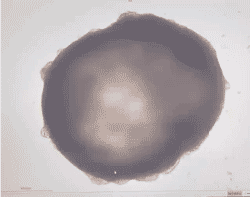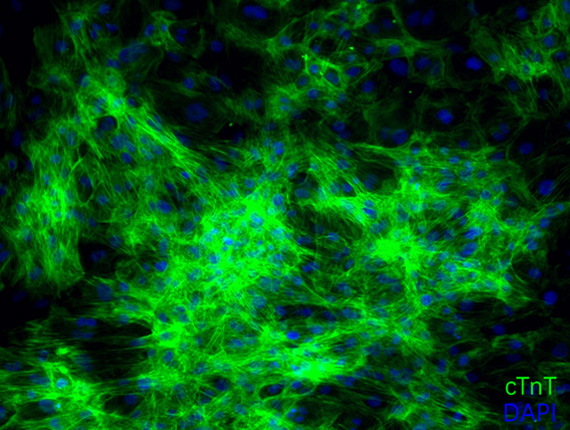> Information test Cardiovascular disease (CVD) is the leading cause of death globally. From 1990 to 2019, the global number of people suffering from cardiovascular disease almost doubled from 271 million to 523 million, while the number of deaths rose from 12.1 million to 18.6 million. This accounts for nearly a third of deaths, globally.[1]
Cardiac models play a pivotal role in studying heart-related conditions and assessing drug toxicity under cardiac-related conditions. Since cardiotoxicity testing is a prerequisite before clinical studies, using a relevant cardiac model is essential.
Our products and services encompass cardiac modeling, identification, and drug testing. This includes ready-to-use cardiac organoids and cardiotoxicity testing services.
ACROBiosystems offers stable and reliable products and services for cardiac modeling, identification, and drug testing. We proudly offer provide ready-to-use cardiac organoids and conduct cardiotoxicity tests utilizing both cell-line and organoid culture techniques, including cell activity assay methods and electrophysiological platforms.
Cardiac organoids derived from human cells mimic native heart tissue and functional properties resulting in a scalable, high-throughput drug screening assay.
Disease modeling studies using cardiac organoids are an alternative option to current animal models, providing a more cost-effective and physiologically relevant platform.
With organoid derived from patients' tissue, doctors can screen out the best drug suitable for the patient and predict the side-effect particularly for the patient.
Ready-to-use cardiac organoids are differentiated using our cardiac organoid kit (RIPO-HWM002K) and are designed to assist with drug efficacy and safety evaluations, as well as pharmacological research.
Our organoids exhibit:
● Native-like cellular composition revealing markers for cardiomyocytes, smooth muscle cells, fibroblasts, endothelial cells, etc.
● Physiological Reproduction through regular, heart-like contractions of the organoid ex vivo.
● Electrical signal impulse and propagation observable using microelectrode arrays.


| Product Type | Cat. No. | Product Description |
|---|---|---|
| Cardiac Organoid | CIPO-HWL002K | Ready-to-use Human iPSC-Derived Cardiac Organoids |
| RIPO-HWM002K | Human iPSC-Derived Cardiac Organoid Differentiation Kit | |
| RIPO-HWM004 | Human iPSC-Derived Cardiac Organoid Maintenance Kit | |
| RIPO-HWM005 | Cardiac Organoid Cryopreservation Kit |

Inhibition of human ether-a-go-go-related gene (hERG) potassium channels caused QT interval prolongation was recorded in cardiac organoids with MEA.

ACROBiosystems provide service for the cardiac organoid differentiation, identification, and cardiac safety evaluation. More than the basic molecular experimental platform of WB, IF, qPCR, we has the reliable electrophysiological platform with the technology of MEA and patch clamp so that we can evaluate the cardiac viability by testing its ion channels’ function.
We offer differentiation services to develop cardiac organoids from iPSCs or human tissue. Organoids are validated by the expression of heart-related protein markers to ensure differentiation and maturity.
Experiments performed:
● Cardiac differentiation
● Validation: WB, IF, qPCR for cTNT, CD31.Photomicrography for morphological evidence.
We can provide:
● Customizable cardiac organoids with different degree of maturity
● Raw data and images
● Detailed validation test report
We can help measure the inhibitory effect of ion-channel blocking drugs (such as hERG potassium channels) on cardiomyocytes to better predict drug cardiotoxicity.
Experiments performed:
● Cell Toxicity screening test: Cell viability. IF and qPCR for marker change.
● Electrophysiological test: MEA for the QT and the CiPA test
We can provide:
● Detailed toxicity test report
● Raw data and images
We provide the constructed Heart failure model with the cardiac organoid derived from the iPSC which will be used for heart failure drug screening.
Experiments performed:
● Heart failure model construction on organoids
● Validation:WB, IF, qPCR for cTNT, CD31
1.MEA for viability
2.Validation by inflammatory factors
We can provide:
● Raw data and images
● Constructed heart failure model based on organoid
● Detailed validation test report
1. Gregory A. Roth MD, et al. Global Burden of Cardiovascular Diseases and Risk Factors, 1990–2019: Update From the GBD 2019 Study. Journal of the American College of Cardiology. December 2020, Volume 76, Issue 25, 22 Pages 2982-3021
2. Blinova et al., 2017, Toxicol Sci (about CiPA iPSC-CM benchmark| Performance)
3. Hofbauer, P., Jahnel, S.M., Papai, N., et al. Cardioids reveals self-organizing principles of human cardiogenesis. Cell (2021), DOI: https://doi.org/10.1016/j.cell.2021.04.034:
This web search service is supported by Google Inc.
